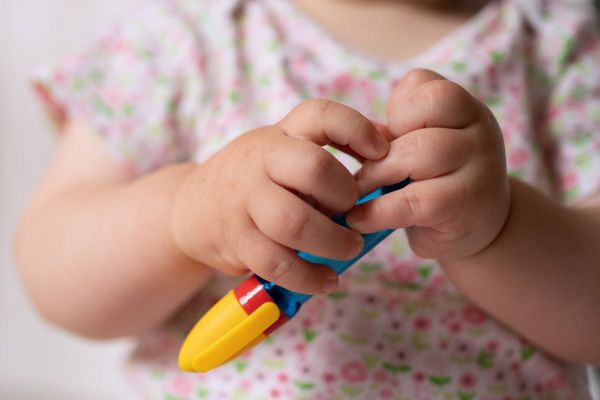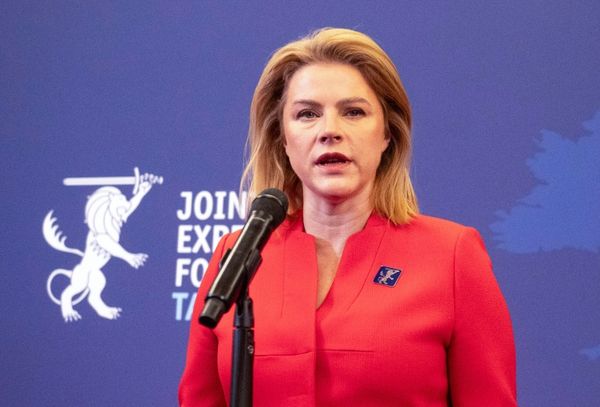Football Australia: Ann Odong
)Katrina Gorry doesn't quite know how or when it started.
There wasn't a single moment — a passing comment from someone she trusted, a photo of herself she didn't like — that flipped a switch in her head, making her care more about numbers on the bathroom scale or the nutrition panels on food containers than how she felt within herself.
Instead, like many people who develop eating disorders, it crept up on her slowly.
So quiet and cumulative were the various pressures she had to navigate as a woman and an athlete that the Matildas midfielder didn't realise she had an eating disorder until she was caught right in the middle of one.
"I've never really had issues with the way I look or my body or nutrition or anything like that, but as I got older, it became more prominent," Gorry says.
"We now get density scans, we get body fat testing all the time, and it really does play in your mind when you know that you have to weigh in and weigh out.
"You start reading into the numbers on the scale instead of your performance on the field.
"As I got older, I started to realise that maybe I did have issues around all of that. And when you try and change so many things, your body starts to change in different ways. I found that a lot. It really hit me for about two years.
"Being an athlete, you feel like you can get through it by yourself, that you're strong enough. I felt like that for the first nine months or so, I was like, 'No, I'm okay, I'm going to get through it, it's fine'.
"And then the months tick on and you're still in a pretty bad place — or you're even worse than what you were a couple months before.
Football Australia: Ann Odong
)A common issue misunderstood
Eating disorders are one of the most common yet misunderstood issues affecting high-performance athletes in Australia.
Research has found that there is a higher rate of disordered eating and clinically-diagnosed eating disorders among athletes compared with non-athletes, particularly athletes who compete in what's called "aesthetic, gravitational or weight-class sports" such as gymnastics, swimming, endurance running and boxing.
Last year, the Australian Institute of Sport (AIS) partnered with the National Eating Disorders Collaboration network to develop a position statement and free toolkit that sports across the country can use to prevent, identify, and help treat athletes who are at risk of developing or have developed unhealthy or disordered eating habits.
"Sport attracts people who have some personality traits around perfectionism and obsessive behaviours," AIS's chief medical officer David Hughes told the ABC last year.
"Almost certainly in high-performance sport, there are some environments which increase a risk for those who are already vulnerable.
"The aim is that we have a healthier, more robust high-performance system, and that's good for athletes, it's good for their health, it's good for their mental well-being, and in the long run, it'll be good for performance as well."
Even though football is not a weight-based sport, Gorry believes eating disorders — and the unhealthy culture around food and physical appearance — affect more of its athletes than studies have so far accounted for.
Football Australia: Rachel Bach
)Other Australian footballers who have spoken publicly about developing eating disorders within the environment of high-performance sport include Sally Shipard and Dianne Alagich.
"It's getting more commonplace," Gorry, who also plays for W-League team Brisbane Roar, says.
"When we weigh in and weigh out, even on national team camps or at our clubs, you hear people talking about their weight: 'I probably shouldn't eat this this morning' or 'Why was I heavier on the scales?'
"Football is not even a weight sport, so you can only imagine what athletes who depend on their weight and the impact it'd have on their life and mental state in and around food."
Football Australia: Rachel Bach
)'I don't know where I'd be if I hadn't started speaking'
Gorry credits speaking to a psychologist alongside a dietician with helping her recognise the disordered habits she had formed, not just in her eating but also in the way she thought about food generally.
"When I look back now, I really don't know where I'd be if I hadn't started speaking about it," she says.
"I started talking to a psychologist who was really helpful at the time; that was through the Matildas.
"Then I started speaking to my family about it, which I think was really important. Knowing that you have that support and knowing that other people have gone through it, I think it makes you feel more comfortable, knowing that you can get through it and you have that support around you.
Football Australia: Ann Odong
)"Working closely with a dietician, not counting your calories or having a food plan, and being really flexible around it helped.
"I stopped labelling foods as 'good' and 'bad'. When you stop doing that and start realising the energy that foods give you, you know more about nutrition and what it's actually doing to your body.
"Humans are going to fluctuate. Women are going to fluctuate if they have their period or not. I don't think we know enough about why we fluctuate but now we're getting the support and knowledge.
"Knowing that so many athletes do go through things like this — we have so much pressure on us to live a certain way and for our bodies to be a certain way, to be in peak condition all the time.
"If you're in and around that kind of sport for 10-plus years, it does eventually take its toll."
The players' union, Professional Footballers Australia (PFA), and Football Australia have resources and protocols in place if a player is suspected of having or reveals they have an eating disorder.
The PFA, which is currently researching eating disorders among W-League and A-League players, offers a nationwide confidential mental health referral network through The Mindroom as well as nutrition resource partner Compeat Nutrition, which provides one-on-one counselling and education sessions.
Football Australia, meanwhile, told the ABC it is well-resourced in its women's national teams to deal with eating disorders and disordered eating.
It also says it has identified and prioritised the wellbeing of players and worked to provide services to support, assist and improve their physical, mental and emotional wellbeing.
"FA follows best practice with a multidisciplinary approach that involves the team doctor, dietician, performance psychologist and wellbeing manager," a spokesperson says.
"We are proactive with screening protocols and, once identified, the multidisciplinary team are the case managers that collaborate to provide the best avenue of support for the player."
Using pregnancy to heal
Football Australia: Ann Odong
)In addition to professional services, another — slightly less expected — process that Gorry believes will help her reshape her relationship with food and her body is pregnancy.
In February, the 28-year old announced on social media that she is expecting her first child, having successfully conceived through IVF.
While she's just starting on her pregnancy journey, Gorry is already feeling the psychological benefits of the process, particularly in helping rebuild trust and appreciation of her body after years of restriction, monitoring and guilt.
"I've been listening to a lot of podcasts around pregnancy and it's all about being kind to your body," Gorry says.
"At the end of the day, you're growing a human, so you need to give it what it wants. And as an athlete, not exercising as much as you were is something that's hard as well.
"In the first 12 weeks, you're so tired so it's really hard to keep the same exercise up. I got reminded a lot to just take my rest when I needed it and look after my body because growing a human does suck a lot out of you.
"I guess pregnancy is going to throw a curve ball at me again. It's been hard with the cravings; as an athlete, you have a pretty strict diet the whole time and you know what you 'should' and 'shouldn't' eat, but when you become pregnant, you crave the most random foods.
"I was vegan before I fell pregnant but all I craved was meat. I called my mum straight away and was like, 'Mum, why? Why am I craving meat? What's happening?' and she said, 'You've just got to eat it.'
"And then just really carby foods: hot chips, bread and Jatz [crackers] were pretty much all I lived off in that first trimester. Really strange to start eating those foods when they were the 'bad' foods when you're in and around sport."
For now, Gorry's aim is to enjoy the transformational process of pregnancy, to get back in touch with the ebbs and flows of her body, to treat herself with patience and gentleness, and if she craves a certain food, to eat it without fear or regret.
"I'm so happy to have so many people supporting me because it's going to be an exciting journey," she says.







